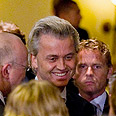
Supporter of Israel. Wilders
צילום: רויטרס
Pro-Israel Right gains power in Holland
Election results still unclear as radical right party gains power in parliament. How did Muslim immigration take center stage in elections campaign? Who will form government? How will Israel be affected?
Dutch Citizens on Wednesday elected a divided parliament and turned the radical Right faction to the third largest party in Holland's parliament. While it is still unclear what kind of coalition will be formed, commentators estimate that Benjamin Netanyahu's cabinet will be pleased with the results.
The Right block may have won the elections, but none of the factions received a significant majority of the parliament's 150 seats. The conservative-liberal People's Party for Freedom and Democracy (VVD), headed by Mark Rutte, won 31 seats while the leftist Labor party, headed by Job Cohen, came in second with 30 seats.
However, the main focus of the elections was without a doubt the strengthening of the anti-Islamic Party for Freedom (PVV) headed by Geert Wilders. The radical right-wing group that supports a ban on head veils and construction of mosques, managed to triple its power by winning 24 seats in the Dutch parliament.
In contrast, the ruling Christian Democratic party came in fourth with only 21 seats.
"It will be very hard to form a coalition," Dutch journalist Coney Moss, who is stationed in Israel, told Ynet. "The coalition will most likely be right-leaning, as we can see from the strengthening of the Party for Freedom," he added.
Western Europe expert Dr. Manfred Gerstenfeld explained that the political system has reached a state of crisis. "The two large parties – the Liberals and Labor – hold opposite views on almost every issue, especially on matters relating to economy and immigration, which are on the top of the national agenda.
"While Labor supports Muslim immigration, the Liberals want to reduce it," he added.
How did the Muslims in Holland become a central topic on the election agenda? "There are almost one million Muslims living in the Netherlands today – mostly from Morocco and Turkey – who represent 5% of the total population," noted Moss. "The ruling coalition during the past eight years neglected to deal with Muslim immigrants, who did not assimilate into Dutch society. As a result, they keep to themselves and often turn to crime," he said.
'Want to feel safer'
Dr. Gerstenfeld believes the choice to put the Muslim issue at the center of the elections campaign was not a coincidence. "Most of the public in Holland thinks that letting Muslim immigrants settle in their country is the biggest mistake in the history of the state."
"Dutch people simply want to feel safer in their country," added Moss.
However, the Labor party, which advocates a multi-cultural society, won almost the same amount of seats as the Liberals. Dr. Karel Martens, an Israeli lecturer living in Holland, noted that "people on the street have mixed feelings about Wilders' rise to power. Everyone knows he holds radical views that do not sound good in public or to the foreign ear. However, many believe that if he joins the coalition he will moderate his expressions."
Opinions may be divided over the election results, but everyone is in agreement on one issue – the relations with Israel. "The radical Right's success is good news for Israel. Wilders supports Israel and is known for his good relations with Israeli Foreign Minister Avigdor Lieberman," said Moss, who added that if Wilders joins the government, he will likely visit the Jewish state.
The Labor, on the other hand, is regarded as having a declared anti-Israeli platform. "In this sense if the Labor stays out of the coalition and Wilders' party joins it, it will be encouraging news for Israel," concluded Dr. Gerstenfeld.










